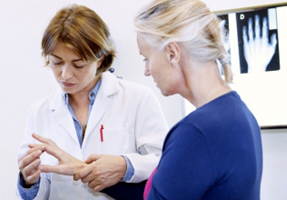Treatment and Prevention
Long-term hypertension and its inadequate treatment (usually it means self-treatment) leads to the damage of the heart vessels, kidneys, brain. At the same time coronary atherosclerosis develops, which may cause coronary heart disease, angina and myocardial infarction. Besides, various nephropathies, renal failure, stroke, and other life-threatening conditions may result from arterial hypertension. Therefore, hypertension treatment should be thoroughly controlled by a medical specialist.
Non-drug treatment methods
Some patients suffering from light forms of hypertension can use no special preparations that are aimed at reducing high blood pressure. The main approach to the treatment of arterial hypertension in such patients is a lifestyle change that includes:
- Losing weight (if the patient is obese);
- Giving up smoking;
- Reducing alcohol intake (less than 20 g of pure alcohol per day for women, and less than 30 g – for men);
- Moderate physical activities (regular walks outdoors, swimming);
- Reducing salt consumption;
- Eating more vegetable food rich in calcium, magnesium and potassium, as well as eating less food containing animal fats.
Drug treatment methods
 Drug therapy is administered if non-drug methods have turned to be ineffective or a patient has high blood pressure and serious risk factors (diabetes, bad heredity, hypertensivecrises, as well as lesions of the target organs - left ventricular hypertrophy, kidney disease or coronary artery atherosclerosis). In the case of light hypertension, if 3-4 months of non-drug treatment have shown no results, doctors administer drug therapy aimed at the treatment of increased arterial pressure. The number of drugs depends on the initial level of blood pressure and associated diseases. But, at the same time,is important to continue non-drug treatment as well.
Drug therapy is administered if non-drug methods have turned to be ineffective or a patient has high blood pressure and serious risk factors (diabetes, bad heredity, hypertensivecrises, as well as lesions of the target organs - left ventricular hypertrophy, kidney disease or coronary artery atherosclerosis). In the case of light hypertension, if 3-4 months of non-drug treatment have shown no results, doctors administer drug therapy aimed at the treatment of increased arterial pressure. The number of drugs depends on the initial level of blood pressure and associated diseases. But, at the same time,is important to continue non-drug treatment as well.
Nowadays there are two main strategies used for the treatment of hypertension:
- Monotherapy (the use of one drug). Usually it is administered in people suffering from stage 1 hypertension and having moderate or low risk of complications.
Combination therapy. It is usually administered in patients with stage 2 and stage 3 hypertension and high or very high risk of developing cardiovascular complications. The use of drugs with various mechanisms of action on the one hand assists in the lowering of high blood pressure, on the other hand reduces the number of possible side effects. As a rule doctors prescribe drugs of the following groups:
- beta blockers;
- diuretics;
- ACE inhibitors;
- calcium channel blockers;
- alpha blockers.
The main rule of drug treatment is its continuity. One should never abruptly stop taking prescribed medications because in some patients even temporary interruption of the therapy may cause severe complications (like myocardial infarction or cerebral stroke).
Even when blood pressure is completely normalized, a thorough medical supervision and regular use of the administered hypertensive drugs are required. Be sure to measure your blood pressure every day and record the results in a special diary.
Prevention of hypertension
Primary prevention of hypertensive disease requires elimination of the existing risk factors. It is necessary to:
- Normalize your daily routine. Sleep duration should be not less than 7-8 hours per day. It is recommended to wake up and go to bed at the same time every day and to change the type of work (limit frequent business trips and night shifts);
- Eat a healthy food. Your diet should consist of fish, lean meat, whole grains, vegetables and fruits. It is recommended to reduce the consumption of salt. Also you should listen to the recommendations of your doctor concerning alcohol consumption.
- Have an active mode of life. If you do not move enough, you should increase the level of your physical activity, but not too much. In the case of hypertension, it is recommended to have regular exercises helping strengthen nervous system and cardiac muscle – walking or swimming.
- Limit stresses. Stress is one of the main factors that provoke increase in blood pressure, therefore, patients with hypertension are recommended to learn meditation practices, autosuggestion, etc.
- Give up bad habits. Patients suffering from high blood pressure should stop smoking (smoking increases the risk of ischemia) and drinking alcohol (50 g of alcohol instantly provoke the rise in arterial pressure by 5-10 mmHg).









